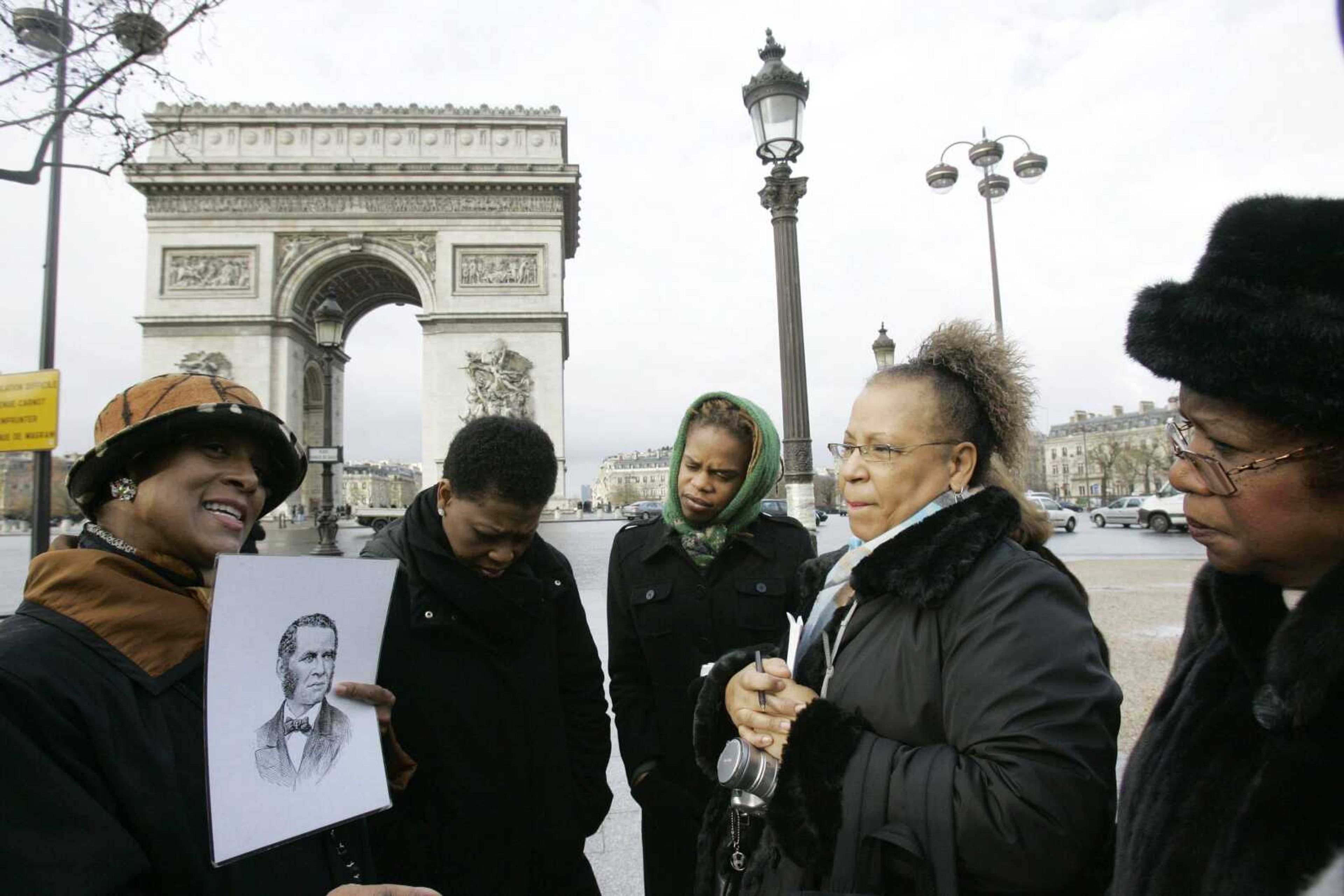PARIS -- Any American with even a slight familiarity with Paris knows about Josephine Baker, the black swivel-hipped cabaret entertainer who shunned racism in America, vaulted to stardom here in 1925, and stayed on to become one of France's most adored 20th century icons.
But what about William Wells Brown, the 19th-century former slave turned abolitionist who once expressed awe that he could pray next to whites at La Madeleine church, or that some tipped their hat to him on Paris streets?
Both historical figures feature high in Black Paris Tours, offering a glimpse of the mutual love affair between black Americans and the City of Light.
Tour guide Ricki Stevenson let me tag along as she escorted four black tourists from Texas as part of a birthday-celebration getaway.
They chose the full-day option, $129 per person for a trek zigzagging through offbeat areas like the Parc Monceau, where poet Langston Hughes once lived in maid's chambers, or a bustling, working-class area that Stevenson dubs "Little Africa."
Stevenson, an Oklahoma native and former TV journalist, has more than enough material to work with: Even after an information-packed tour lasting nine hours, I couldn't help thinking we had only scratched the surface.
The tour was especially eye-opening in France, where minorities from the substantial black and North African communities -- often with origins in former French colonies -- are not quantified in the census. The state considers everyone simply French, in its bid to be officially colorblind and stem discrimination. (In practice, though, North African immigrants and their children do complain of discrimination, and riots broke out in immigrant areas in 2005.)
American blacks in France, though, are a category unto themselves.
"In many ways, African-Americans came to France as a sort of privileged minority, a kind of model minority, if you will -- a group that benefited not only from French fascination with blackness, but a French fascination about Americanness," said Tyler Stovall, a history professor of the University of California, Berkeley. "Jazz comes to France at roughly the same time as Hollywood movies -- both are embraced enthusiastically."
Baker, who dazzled Paris audiences with her skimpy outfits and banana skirts, gets high billing in this tour. But so do jazz greats like Sidney Bechet, a longtime Paris resident, and the all-black 369th Regiment of World War I best known as the Harlem Hellfighters.
Paris tours about black history have come and gone, but Stevenson's has unusual lasting power, and is now in its ninth year.
This is informal, personal-touch tourism: Don't look for a heated tour bus or lunch included. Like everyday Parisians, you get around by Metro or -- better for sightseeing -- public bus. Forget the Louvre or the Eiffel Tower.
After meeting at a bakery on the Champs-Elysees, we crisscrossed the Right Bank, hitting sites unlikely to be seen in standard tour guidebooks, like an Alexandre Dumas statue (his mother was Haitian), a cabaret hall where Baker was the main attraction, and an ornate hotel where W.E.B. Du Bois hosted the Pan African Congress in 1919.
Stevenson briefed her charges with advice on how not to ruffle Parisians -- like always saying "Bonjour" to shop personnel, and not attributing slow restaurant service to racism but to the one-size-fits-all aloofness of many Paris waiters.
"The French don't do bacon and eggs," she warned her guests.
The first stop was the Arc de Triomphe, where the encyclopedic Stevenson said former American slaves who made it to France in the 19th century came to sense freedom beyond the reach of bounty hunters.
Stevenson cited unofficial figures indicating that up to 50,000 free blacks came here from Louisiana in the decades after Napoleon sold the territory to the United States in 1803, fearing greater restrictions under the new authorities.
The best-known wave of black Americans to France came during World War I, when some 200,000 were brought over to fight.
After the war, many black musicians migrated to feed France's infatuation with jazz.
She packs the tour with a dose of African pride: Africans explored France before it was a country; French farmers learned skills in animal husbandry and ironmaking from Africans; Napoleon admired Hannibal, the North African general of Rome-fighting fame in antiquity, she said.
France's effort to ignore racial differences hasn't succeeded in abolishing racism. Even the French anti-discrimination agency acknowledges that many young blacks and Arabs today struggle for acceptance or land jobs.
If you go
- Black Paris Tours: www.blackparistour.com. Offered Tuesday-Friday, year-round except for August, late December and January.Cost: $129 per person for a daylong tour (does not include lunch), and $86 for a half-day tour. Discounts for groups of six or more.
- Discover African-American History in Paris: www.discoverparis.net/african--americans.html.
Connect with the Southeast Missourian Newsroom:
For corrections to this story or other insights for the editor, click here. To submit a letter to the editor, click here. To learn about the Southeast Missourian’s AI Policy, click here.








